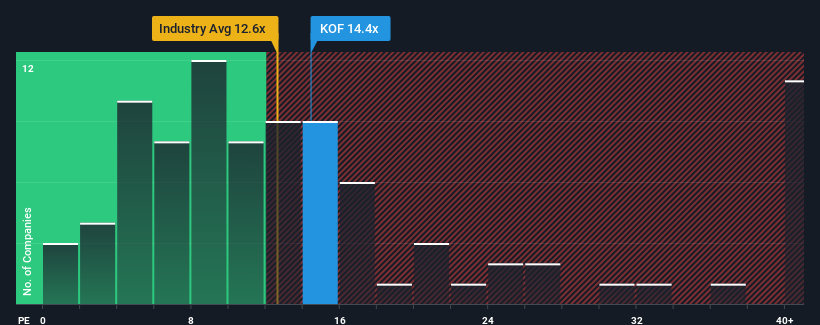Stock Analysis
- France
- /
- Consumer Durables
- /
- ENXTPA:KOF
Pinning Down Kaufman & Broad S.A.'s (EPA:KOF) P/E Is Difficult Right Now

With a median price-to-earnings (or "P/E") ratio of close to 16x in France, you could be forgiven for feeling indifferent about Kaufman & Broad S.A.'s (EPA:KOF) P/E ratio of 14.4x. Although, it's not wise to simply ignore the P/E without explanation as investors may be disregarding a distinct opportunity or a costly mistake.
Kaufman & Broad has been doing a good job lately as it's been growing earnings at a solid pace. It might be that many expect the respectable earnings performance to wane, which has kept the P/E from rising. If that doesn't eventuate, then existing shareholders probably aren't too pessimistic about the future direction of the share price.
Check out our latest analysis for Kaufman & Broad

How Is Kaufman & Broad's Growth Trending?
The only time you'd be comfortable seeing a P/E like Kaufman & Broad's is when the company's growth is tracking the market closely.
Retrospectively, the last year delivered an exceptional 30% gain to the company's bottom line. The latest three year period has also seen a 15% overall rise in EPS, aided extensively by its short-term performance. Therefore, it's fair to say the earnings growth recently has been respectable for the company.
This is in contrast to the rest of the market, which is expected to grow by 16% over the next year, materially higher than the company's recent medium-term annualised growth rates.
In light of this, it's curious that Kaufman & Broad's P/E sits in line with the majority of other companies. Apparently many investors in the company are less bearish than recent times would indicate and aren't willing to let go of their stock right now. They may be setting themselves up for future disappointment if the P/E falls to levels more in line with recent growth rates.
The Key Takeaway
It's argued the price-to-earnings ratio is an inferior measure of value within certain industries, but it can be a powerful business sentiment indicator.
Our examination of Kaufman & Broad revealed its three-year earnings trends aren't impacting its P/E as much as we would have predicted, given they look worse than current market expectations. When we see weak earnings with slower than market growth, we suspect the share price is at risk of declining, sending the moderate P/E lower. Unless the recent medium-term conditions improve, it's challenging to accept these prices as being reasonable.
You should always think about risks. Case in point, we've spotted 1 warning sign for Kaufman & Broad you should be aware of.
It's important to make sure you look for a great company, not just the first idea you come across. So take a peek at this free list of interesting companies with strong recent earnings growth (and a low P/E).
Valuation is complex, but we're helping make it simple.
Find out whether Kaufman & Broad is potentially over or undervalued by checking out our comprehensive analysis, which includes fair value estimates, risks and warnings, dividends, insider transactions and financial health.
View the Free AnalysisHave feedback on this article? Concerned about the content? Get in touch with us directly. Alternatively, email editorial-team (at) simplywallst.com.
This article by Simply Wall St is general in nature. We provide commentary based on historical data and analyst forecasts only using an unbiased methodology and our articles are not intended to be financial advice. It does not constitute a recommendation to buy or sell any stock, and does not take account of your objectives, or your financial situation. We aim to bring you long-term focused analysis driven by fundamental data. Note that our analysis may not factor in the latest price-sensitive company announcements or qualitative material. Simply Wall St has no position in any stocks mentioned.

Simply Wall St
About ENXTPA:KOF
Kaufman & Broad
Kaufman & Broad S.A. operates as a property developer and builder in France.
Excellent balance sheet established dividend payer.
